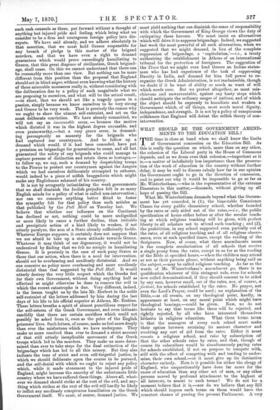ENGLISH DEGENERACY AND GREECE.
ONE of our contemporaries is greatly agitated because "the Government of King George have shown no more consideration to England than they would have shown to Portugal and Mexico," and because the only fear of the Greek party abroad was lest "the Italian Government and people might determine to make reprisals on Greece by inflicting on her some signal humiliation, and that their energy might shame us into a little anger of our own." So far as this feeling of the degeneracy of England exists,—and we are very doubtful as to its extent,—it is of course due to causes most of which we regard with as little favour as our contem- porary. We have not been and are not friends of the some- what meaningless doctrine of non-intervention; we have never doubted that if nations as well as individuals should entertain and freely express their moral sympathies and antipathies, there is an extent of moral sympathy and antipathy which at times calls for physical aid or resistance, if it is not to be a mere imposture. But strongly as we hold this, and protest against any attempt to withdraw England from her proper place among the nations of Europe, nay, precisely because we hold this so strongly as we do,—we must condemn as one of the most dangerous influences tending to foster the non-intervention party in their prepossessions, the premature bitterness ex- pressed against our Government for not prejudging the political aspects of this Greek massacre. When we are told that "if Oliver Cromwell were living, he would instantly despatch a regiment of cavalry to the Pira3us, so that when our repre- sentative and the gentlemen of his staff leave their homes, they might have a suitable escort," we can only say that we cannot see the least historical justification for a belief that Olivier Cromwell would have done anything so premature and so undignified in its violent and inconsiderate haste. It is
such rash counsels as these, put forward without a thought of anything but injured pride and feeling, which bring what we consider to be a firm and courageous foreign policy into dis- repute. We have said already, and we adhere absolutely to that assertion, that we must hold Greece responsible for any breach of pledge in this matter of the brigand murders, and that we have even a right to demand guarantees which would prove exceedingly humiliating to Greece, that this great disgrace of civilization, Greek brigand- age, shall cease. On this we cannot understand that there can be reasonably more than one view. But nothing can be more different from this position than the proposal that England should act in blind anger, without even knowing what the history of these miserable massacres really is, without considering with the deliberation due to a policy of such magnitude what we are proposing to ourselves, and what will be the actual result, —in short, that we should act like a tragedy queen in a passion, simply because we know ourselves to be very strong and Greece to be very weak. That is precisely the reason why we ought to show the utmost self-restraint, and act on the most deliberate conviction. We have already committed, we will not say an inexcusable error, — because the motive which dictated it was in the highest degree excusable, and even praiseworthy,—but a very grave error, in demand- ing peremptorily an amnesty for the brigands who had captured our countrymen. And to follow up a demand which would, if it had been conceded, have put a premium on brigandage for generations to come, and all but
guaranteed the safety of any brigands who could manage to capture persons of distinction and retain them as hostages,—
to follow up, we say, such a demand by despatching troops to the Pirasus to protect our countrymen against the dangers which we had ourselves deliberately attempted to enhance, would indeed be a piece of selfish braggadocio which might make any Englishman ashamed of his country.
It is not by arrogantly intimidating the weak governments that we shall diminish the foolish prejudice felt in so many English minds for a policy of what is called non-intervention ; nor can we conceive anything better fitted to foster the sympathy felt for that policy than such articles as that published by the Pall Mall on Tuesday last. We believe that whether our influence on the Continent has declined or not, nothing could be more undignified or more likely to cause a further decline, than irritable and precipitate action of a kind likely to weaken, if not utterly paralyze, the arm of a State already sufficiently feeble.
Whatever Europe supposes, it certainly does not suppose that we are afraid to take up a stern attitude towards Greece. Whatever it may think of our degeneracy, it would not be undeceived by finding that we felt no scruple in humiliating Greece. It is precisely in the case of such puny States as these that our action, when there is a need for intervention, should not be overbearing and needlessly dictatorial. And we -can conceive no policy more overbearing and more needlessly dictatorial than that suggested by the Pall Mall. It would latterly destroy the very little respect which the Greeks feel for their own Government, without doing anything half as effectual as might otherwise be done to remove the evil to which the recent catastrophe is due. Very different, indeed, is the lesson taught us by the late Mr. Herbert in the noble self-restraint of the letters addressed by him during the last days of his life to his official superior at Athens, Mr. Erskine.
These letters breathe a spirit of almost punctilious respect for the self-esteem of the Greek Government, and even intimate candidly that there are certain sacrifices which could not possibly be asked from it, even as the price of the English prisoners' lives. Such letters, of course, make us feel more deeply than ever the misfortune which we have undergone. They make us more resolved than ever to demand a strict account of that still utterly inexplicable movement of the Greek troops which led to the murders. They make us more deter- mined than ever to take steps for the final extinction of the brigandage which has led to all this misery. But they also indicate the tone of strict and even self-forgetful justice, in which we should deliberate upon the course to be pursued, and the self-denial with which we ought to reject any policy which, while it made atonement to the injured pride of England, might increase the anarchy of the unfortunate little country where we have suffered these things. Above all, what- ever we demand should strike at the root of the evil, and any- thing which strikes at the root of the evil will hardly be likely to inflict any needlessly conspicuous humiliation on the Greek Government itself. We must, of course, demand justice. We must yield nothing that can diminish the sense of responsibility with which the Government of King George views the duty of extirpating these horrors. We must insist on alternatives which will drive it to suppress brigandage. Indeed, we suggested last week the most powerful of all such alternatives, when we suggested that we might demand, in lieu of the complete suppression of brigandage, a capitulation,'—i.e., a treaty authorizing the establishment in Athens of an international tribunal for the protection of foreigners. The suggestion of the Times that we might even lend Greece an Indian states- man who has had experience of the task of suppressing Dacoity in India, and demand for him full power to re- organize the Greek Administration, is not inadmissible, though we doubt if it be want of ability so much as want of will which needs cure. But we protest altogether, as most mis- chievous and unwarrantable, against any hasty steps which should anticipate the ordinary usages of nations, and of which the object should be expressly to humiliate and weaken a Government which, of all things, most needs moral dignity, independence, and strength. It is not by a policy of conspicuous selfishness that England will defeat the selfish theory of non- intervention.































 Previous page
Previous page